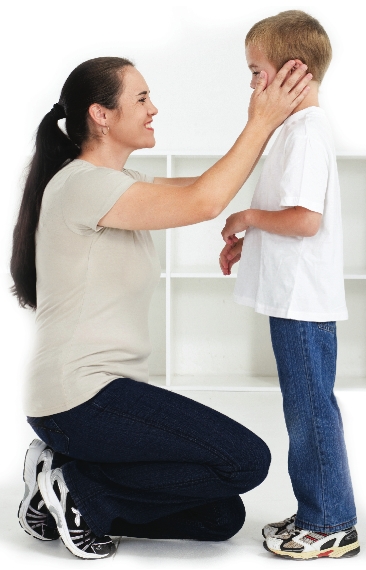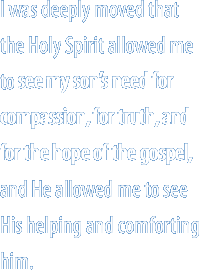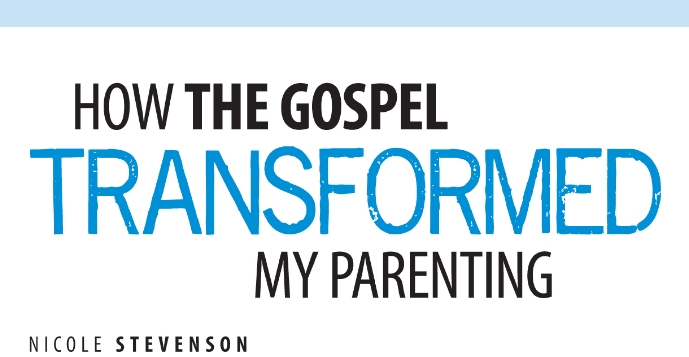
HOME / PROCLAMATION! MAGAZINE / 2014 / SUMMER / HOW THE GOSPEL TRANSFORMED MY PARENTING

 Looking back over the four years that I’ve been out of Adventism, I’m overwhelmed with how much the Father has worked in me to align me with truth and reality. He has been dealing with my heart in many ways, but I’ve been especially aware of His pruning of me in my parenting. Through Scripture reading, trials, and examples from the body of Christ, I’ve come to see how different my understanding of “good parenting” was from what God calls parents to be. At the same time, I have also seen that my experience in Adventism as well as my Adventist understanding of God played a significant role in my misconceptions about successful parenting.
Looking back over the four years that I’ve been out of Adventism, I’m overwhelmed with how much the Father has worked in me to align me with truth and reality. He has been dealing with my heart in many ways, but I’ve been especially aware of His pruning of me in my parenting. Through Scripture reading, trials, and examples from the body of Christ, I’ve come to see how different my understanding of “good parenting” was from what God calls parents to be. At the same time, I have also seen that my experience in Adventism as well as my Adventist understanding of God played a significant role in my misconceptions about successful parenting.
It is no surprise to me that I needed a great deal of help with parenting. For various reasons much of what I learned about raising children came from looking outside of my own growing-up experiences. I actually spent a great deal of time studying other families, watching how teachers interacted with us students, and paying close attention to the gossip of the adults around me as they spoke about so and so’s parenting or children. Being a keen observer driven by the desire to get things “right”, I came to believe that “good parents” can control their children and elicit unquestioning obedience. Thus, the children of “good parents” grow up to be well-liked, well-rounded, and successful contributors to society.
This result, I concluded, could happen in a couple of different ways. On the one hand, middle to lower middle-class children, fearful of angering or disappointing their parents, could work hard to maintain good standing with the adults in their lives. In these cases, parents managed their children with approval for good behavior and shame or outrage for unacceptable behavior. On the other hand, more well-to-do parents had more leverage and were able to “inspire” their kids to work hard and obey by offering them incentives such as money, possessions, and privileges which would be theirs if they conformed to expectations.
As I studied those around me I also noticed how adults handled disobedience. Truthfully, disobedience was more familiar to me than conformity; had you asked either of my parents, they likely would have told you that I was one of those difficult children. Many of my peers (probably also in that “difficult child” category) received the same reaction I did when we disappointed our parents: they withdrew. The withdrawal could be either emotional or physical and could include steps as drastic as sending us away to boarding school or to a distant state to live with a different parent or relative. In fact, the greater or more public the offense, the greater or more public the withdrawal.
The message jelled: good behavior meant acceptance and perhaps rewards; bad behavior meant withdrawal and shame no doubt intended to motivate new obedience.
Prepared for parenting
Eventually I met my husband, was married, and had children of my own. As we entered the world of parenting, my husband and I were prepared! We had a long list of things we would never allow our kids to do including never allowing them to throw food on the floor at restaurants, never allowing our little girl to scream when she played or threw fits, and never allowing our son to be one of those rowdy, rough-housing boys. Moreover, our list included things we would never do. We would never count to three to speed up obedience; we would never permit our home to be overrun by toys or by reruns of Elmo—you get the drift.
Yes, we were “those” people—trained, disciplined, and ready to rear up our self-controlled, well-rounded, successful children.
Needless to say, reality hit us hard. Our expectations, which we thought we could easily accomplish, became the condemnation of our own hearts us as we watched our ideals prove to be impossible. I, the stay-at-home mother, was trying my hardest to follow the rules I had so carefully learned through years of observation—and I was failing to be a good parent.
I see my sin
It was after we left Adventism and I had begun spending a great deal of time in Scripture that things started to change for me. As I began to seek to live under the authority of the Bible and to trust that God’s word was sufficient and trustworthy, I began to see the Lord meeting me in the places of my greatest need. For me, as a mother, that needy place was in my parenting. The Holy Spirit met me in the full light of truth and began to reveal to me the wretched sin in my heart that was manifesting in my attempts to be a good parent. I came to see that the lack of parenting I received while growing up and my own broken reactions to the abuses I endured as a child were driving my need to “get it right” and to receive external accolades that would reassure me that I was doing better than my own parents had done for me. I came to see that the trauma I experienced from the sins done against me as a child, trauma I had not previously acknowledged nor submitted to the Lord, was causing me to sin against my own children. In reality, my desire to “get it right” was nursed by a need for my children to make me look good in order to soothe my own fears that I would never be successful, rather than by a commitment to nurture them and to teach them trust and godly obedience.
I believe it is God’s grace and entrustment that He gave my husband and me two incredibly strong-willed children. I was learning that when it came to a battle of the wills, we were all tied for first place. Increasingly the notion of “breaking their wills” to elicit obedience was becoming absurd and beginning to look abusive. Furthermore, I was discovering that children with strong wills are not motivated by losing their prized possessions, because there is no possession they prize more than “victory” in a battle. Everything I understood about controlling or inspiring obedience evaporated, and I was left helpless and filled with shame and inner rage about my own inadequacies.
Furthermore, I saw myself repeating a pattern that I had despised in adults when I was growing up: the more publicly my child would rebel, the angrier and more punitive I became. The Holy Spirit made it clear to me that yelling and shaming were destroying my older child (the younger was still a baby at the time) and that I was living well outside the realm of “self-control”; I was convicted that I was in sin, and I needed help.
By this time I had already learned to trust the people God put in my life to help me grow in Him, and I decided to seek help from my dear friend and mentor from the local former Adventist group. She prayed for me and my son and was a great source of support to me during this time. She shared her own battle with yelling when her children were young and her own sense of helplessness to get them to obey as she thought they ought. She told me how she repented of her yelling and how the Lord helped her learn how to deal with her kids by imagining herself responding to Jesus instead of to her own anger.
As we discussed where we learned our early ideas of parenting, I began to see that my focus was wrong. My reactions to my son were rooted in my own brokenness and sin! He was not the problem, I was. As we talked she told me to pray that the Lord would love my kids through me and to thank Him for what He was doing that I couldn’t see. We had talks like these many times, and then one day, everything changed.
“I can’t obey…”
It was an afternoon like many others, and my son and I had locked horns over a much-needed nap. This time, though, I recognized our dynamics and saw where we were headed. Tearful and trembling with frustration, I walked away from the situation and went into my bedroom and prayed. I asked the Lord to love my son through me and to help me be the parent He wanted me to be. I told Him how badly I wanted to be a good mother, but I had no idea what to do with the sin in me. I pled desperately for Him to help me.
I finally emerged and slowly walked down the hall to my son’s room, continuing to pray in my heart as I went. Then I saw him; he was face-down on his bed, crying helplessly. As I entered he turned and looked at me. Huge tears had smeared his face, and his eyes were filled with despair.
Suddenly I saw the effects of my shame and anger on my son’s heart, and I was overcome with grief and compassion for him. He saw that my face was no longer tense, and he felt safe to begin to speak, “Mommy, I want to obey you so much, but no matter how hard I try I just can’t…”
In that moment his sorrow and honesty articulated the agony in my own heart that, just moments before, I had been pouring out to the Lord. I began to cry with him, identifying with his despair, and took him into my arms. I asked him to forgive me for yelling and explained that I was sinning when I spoke that way to him. “That is not how God teaches His children,” I said.
We talked there on the floor of his room, and I reminded him of the gospel and all we had been teaching him about human depravity and God’s grace. In those moments we were brother and sister in Christ, and we shared in the agony of longing to please God and being confronted with our own sins of rebellion. We prayed together, and when we were done my son looked at me with joy in his eyes and said, “Mommy, He did it! He helped me! I know I can obey you!” Then he climbed into bed peacefully and fell asleep.
I was deeply moved that the Holy Spirit allowed me to see my son’s need for compassion, for truth, and for the hope of the gospel, and He allowed me to see His helping and comforting him. The wonder of this exchange was not that my son slept; it was that the Holy Spirit allowed me to see past my sinful anger to recognize what my son needed, and that He equipped me to provide it!
Informed by the word
Once more the Holy Spirit helped me see how biblical reality informs every area of life. I am learning that it is unrealistic to expect unquestioning-first-time-perfect obedience from my children. As my son and I talked together that afternoon about the human condition and the hope of the gospel, I realized that, according to Scripture, what anyone should expect from their child is depravity, and that what God expects from Christian parents is that we train up our children in biblical truth, teaching them obedience to God through a heart changed by the gospel. I’ve realized that what my children need is loving parents who take their hands and keep them close, even in their disobedience, while guiding and discipling them with the truth of God’s counsel. They need our unconditional love and relationship—the very things we receive from Jesus!
When my heart was embittered and I was pierced within, then I was senseless and ignorant; I was like a beast before You. Nevertheless I am continually with You; You have taken hold of my right hand. With Your counsel You will guide me, and afterward receive me to glory (Ps. 73:21-24).
Now I frequently ask for my children’s forgiveness when I sin against them in frustration or anger, and in turn they often do the same. These moments have opened up more opportunity to show them that God is bigger than mom and dad and that we are all sinners in need of a Savior and of His word. As time has passed my kids have come to know that God is “compassionate and gracious, slow to anger, and abounding in loving kindness and truth, maintaining love to thousands, and forgiving wickedness, rebellion and sin…” (Ex. 34:6,7a). Both of my kids are able to separate my husband and me from the ways God deals with them because we have been honest with each other. We are all growing in Christ and in our understanding of truth; all four of us are sinners who need Jesus.
The Holy Spirit convicted me that at the root of my efforts to control my son was an idol of “perfect” parenting to which I clung, hoping that I would be honored for my success and thus find relief from my shame. Certainly it is still my desire that my children learn obedience, contribute to society, and learn to love and be loved. These desires are not wrong!
Now, however, I see that my fundamental responsibility to my children is to point them to the Lord Jesus Christ as their primary object of affection and obedience. Their purpose is to bring glory to Him—not to me. My shame is not their problem. As I have asked the Lord to deal with my shame, I have been learning how to remain emotionally present with my children even when they are acting out. Both they and I are learning that while there are consequences for poor behavior, those consequences don’t include emotional punishment or loss of “standing” in the family. As these truths have fallen into place in my life, I find myself becoming less self-protective, and I understand in a new way that the object of glory in all things must be the Triune God.
Adventism’s role
As I’ve reflected on how the culture of Adventism affected my upbringing and my understanding of parenting, I’ve identified two ways it shaped my perception of family dynamics. First, both children and parents learn that obedience must be exacted by fear of shame and loss, and second, it is the responsibility, within Adventist culture, of the least “important” members to uphold the reputation of those with the greater importance.
For example, all one must do is read Ellen G. White’s letters to her sons or Arthur Maxwell’s Bedtime Stories to see a pattern of shame and fear of loss being used to engender unquestioning obedience in children. With Ellen White being “a continuing and authoritative source of truth” (Fundamental Belief #18) and A. Maxwell lining the bookshelves of most good Adventist libraries, it’s no wonder this sort of parenting permeates the Adventist culture.
Even God, as I understood Him, punished, rejected, and ousted human failures. I had been taught in Adventist schools that if I was not prepared to die one day for the Sabbath, or if I didn’t confess every sin properly, I would be cast into the lake of fire. Similarly, unless I had the character of Christ perfectly reproduced in me and I kept the law, especially honoring the Sabbath, I could not be saved. My success, therefore, as a daughter, a parent, or a child of God depended upon “getting it right” and thus avoiding the shame of rejection and ultimate loss.
Closely related to avoiding shame was the issue of “reputation management”. In my experience as an Adventist I knew that it was my job to uphold and defend the reputation of my faith community, academic institutions, and religious authorities to outsiders. One way I protected them was by not sharing all the peculiar details of our beliefs with non-Adventists unless I knew they would be easily accepted. I also knew that it was our job as Adventists to share the “fuller message of the gospel” (according to the writings and visions of Ellen White) and to strive to vindicate God to the watching universe through my obedience to the 10 Commandments. It was reputation management from the bottom up!
As I’ve processed how these underlying dynamics shaped my ideas about parenting, I have become convinced that when leaving a religious cult it’s not enough simply to reject false doctrines. The nature of a cult is that it permeates every area of one’s life and world view because it requires one to experience life outside of reality. It is my opinion that Adventism promotes a toxic view of relationships that, intentionally or not, creates an environment where abusive family systems can hide. Without the reality of the biblical gospel, there is no ground of truth to reveal and correct the dynamics of blame, shame, and protecting the secrets.
If those of us who grew up in a world of insidious deception are left to our programmed perceptions and our natural coping methods, we will continue to sin against others from a place of dark and un-examined brokenness. The only hope for healing is found in the person of the Lord Jesus Christ and in the washing of His sufficient and unerring Word. As the friend I mentioned earlier also told me, “Nikki, truth is not in our heads. Truth is in the word of God.” For this reason, Psalm 139:23, 24 has become very precious to me, and He is faithful to answer me.
“Search me, O God, and know my heart; try me and know my anxious thoughts; and see if there be any hurtful way in me, and lead me in the everlasting way.”
It has been necessary for me to examine my heart regularly, allowing the word of God to cleanse me from the deep-seated effects of growing up in a false religious world view, an unsafe social structure, and a broken family system all held together by a shared misunderstanding of God and reality.
The Holy Spirit continues to refine my understanding of reality as I remain in Scripture and submit my mind to its authority. He reveals to me my wrong perceptions of truth and teaches me how I am to interact with the world as I live in Him.
The God revealed in Scripture is a Father to His children; He disciplines us for the purposes of transforming us into the image of His beloved Son. It is true that, as believers, we bear the name of Jesus to the world, but our true Father does not depend on us to make Him look good; on the contrary, we depend on Him even to understand what good is.
Our Father is patient, gracious, and abounding in steadfast love. He does not forsake us or shame us when we fail. He will not oust us if we do not measure up; He knows our frame (Ps. 103: 14). If the Son sets us free, we are free indeed, and the Father is faithfully and eternally committed to us because of the work of the Son. Jesus has set us free from the fear of man so that we can live in truth, walk in integrity, and serve Him in love.
When we are alive in Jesus, even parenting is about learning to trust Him instead of struggling for success. Because Jesus has been successful, I can rest, and I and my children can gratefully receive the love of our one Good Parent. †

Copyright 2014 Life Assurance Ministries, Inc., Camp Verde, Arizona, USA. All rights reserved. Revised August 25, 2014. Contact email: proclamation@gmail.com

 Nicole Stevenson lives in Yucaipa, California, with her husband Carel and their children Joshua and Abigail. A graduate of La Sierra University with a degree in social work, Nicole’s joy is knowing Christ Jesus and living for the gospel as she teaches her children and participates in ministry with Former Adventist Fellowship and the community outreach Loma Linda Word Search.
Nicole Stevenson lives in Yucaipa, California, with her husband Carel and their children Joshua and Abigail. A graduate of La Sierra University with a degree in social work, Nicole’s joy is knowing Christ Jesus and living for the gospel as she teaches her children and participates in ministry with Former Adventist Fellowship and the community outreach Loma Linda Word Search.

S U M M E R • 2 0 1 4
VOLUME 15, ISSUE 2